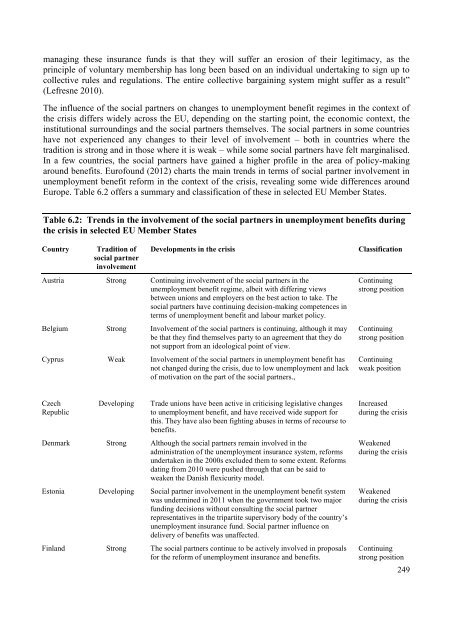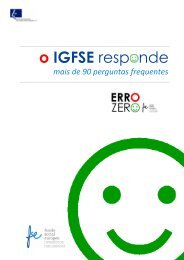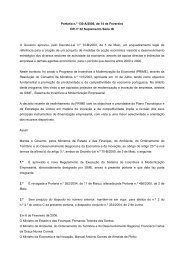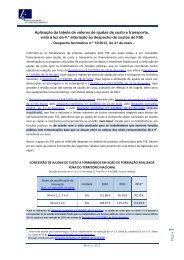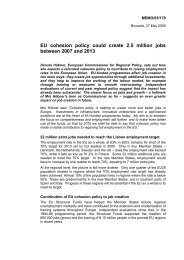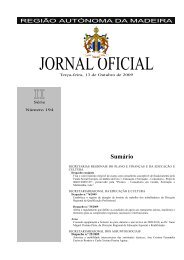Industrial Relations in Europe 2012 - European Commission - Europa
Industrial Relations in Europe 2012 - European Commission - Europa
Industrial Relations in Europe 2012 - European Commission - Europa
You also want an ePaper? Increase the reach of your titles
YUMPU automatically turns print PDFs into web optimized ePapers that Google loves.
manag<strong>in</strong>g these <strong>in</strong>surance funds is that they will suffer an erosion of their legitimacy, as the<br />
pr<strong>in</strong>ciple of voluntary membership has long been based on an <strong>in</strong>dividual undertak<strong>in</strong>g to sign up to<br />
collective rules and regulations. The entire collective barga<strong>in</strong><strong>in</strong>g system might suffer as a result”<br />
(Lefresne 2010).<br />
The <strong>in</strong>fluence of the social partners on changes to unemployment benefit regimes <strong>in</strong> the context of<br />
the crisis differs widely across the EU, depend<strong>in</strong>g on the start<strong>in</strong>g po<strong>in</strong>t, the economic context, the<br />
<strong>in</strong>stitutional surround<strong>in</strong>gs and the social partners themselves. The social partners <strong>in</strong> some countries<br />
have not experienced any changes to their level of <strong>in</strong>volvement – both <strong>in</strong> countries where the<br />
tradition is strong and <strong>in</strong> those where it is weak – while some social partners have felt marg<strong>in</strong>alised.<br />
In a few countries, the social partners have ga<strong>in</strong>ed a higher profile <strong>in</strong> the area of policy-mak<strong>in</strong>g<br />
around benefits. Eurofound (<strong>2012</strong>) charts the ma<strong>in</strong> trends <strong>in</strong> terms of social partner <strong>in</strong>volvement <strong>in</strong><br />
unemployment benefit reform <strong>in</strong> the context of the crisis, reveal<strong>in</strong>g some wide differences around<br />
<strong>Europe</strong>. Table 6.2 offers a summary and classification of these <strong>in</strong> selected EU Member States.<br />
Table 6.2: Trends <strong>in</strong> the <strong>in</strong>volvement of the social partners <strong>in</strong> unemployment benefits dur<strong>in</strong>g<br />
the crisis <strong>in</strong> selected EU Member States<br />
Country<br />
Tradition of<br />
social partner<br />
<strong>in</strong>volvement<br />
Developments <strong>in</strong> the crisis<br />
Austria Strong Cont<strong>in</strong>u<strong>in</strong>g <strong>in</strong>volvement of the social partners <strong>in</strong> the<br />
unemployment benefit regime, albeit with differ<strong>in</strong>g views<br />
between unions and employers on the best action to take. The<br />
social partners have cont<strong>in</strong>u<strong>in</strong>g decision-mak<strong>in</strong>g competences <strong>in</strong><br />
terms of unemployment benefit and labour market policy.<br />
Belgium Strong Involvement of the social partners is cont<strong>in</strong>u<strong>in</strong>g, although it may<br />
be that they f<strong>in</strong>d themselves party to an agreement that they do<br />
not support from an ideological po<strong>in</strong>t of view.<br />
Cyprus Weak Involvement of the social partners <strong>in</strong> unemployment benefit has<br />
not changed dur<strong>in</strong>g the crisis, due to low unemployment and lack<br />
of motivation on the part of the social partners.,<br />
Classification<br />
Cont<strong>in</strong>u<strong>in</strong>g<br />
strong position<br />
Cont<strong>in</strong>u<strong>in</strong>g<br />
strong position<br />
Cont<strong>in</strong>u<strong>in</strong>g<br />
weak position<br />
Czech<br />
Republic<br />
Develop<strong>in</strong>g<br />
Trade unions have been active <strong>in</strong> criticis<strong>in</strong>g legislative changes<br />
to unemployment benefit, and have received wide support for<br />
this. They have also been fight<strong>in</strong>g abuses <strong>in</strong> terms of recourse to<br />
benefits.<br />
Denmark Strong Although the social partners rema<strong>in</strong> <strong>in</strong>volved <strong>in</strong> the<br />
adm<strong>in</strong>istration of the unemployment <strong>in</strong>surance system, reforms<br />
undertaken <strong>in</strong> the 2000s excluded them to some extent. Reforms<br />
dat<strong>in</strong>g from 2010 were pushed through that can be said to<br />
weaken the Danish flexicurity model.<br />
Estonia Develop<strong>in</strong>g Social partner <strong>in</strong>volvement <strong>in</strong> the unemployment benefit system<br />
was underm<strong>in</strong>ed <strong>in</strong> 2011 when the government took two major<br />
fund<strong>in</strong>g decisions without consult<strong>in</strong>g the social partner<br />
representatives <strong>in</strong> the tripartite supervisory body of the country’s<br />
unemployment <strong>in</strong>surance fund. Social partner <strong>in</strong>fluence on<br />
delivery of benefits was unaffected.<br />
F<strong>in</strong>land Strong The social partners cont<strong>in</strong>ue to be actively <strong>in</strong>volved <strong>in</strong> proposals<br />
for the reform of unemployment <strong>in</strong>surance and benefits.<br />
Increased<br />
dur<strong>in</strong>g the crisis<br />
Weakened<br />
dur<strong>in</strong>g the crisis<br />
Weakened<br />
dur<strong>in</strong>g the crisis<br />
Cont<strong>in</strong>u<strong>in</strong>g<br />
strong position<br />
249


